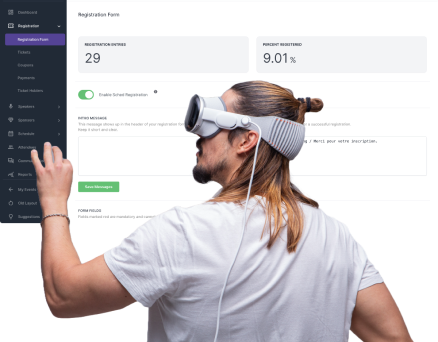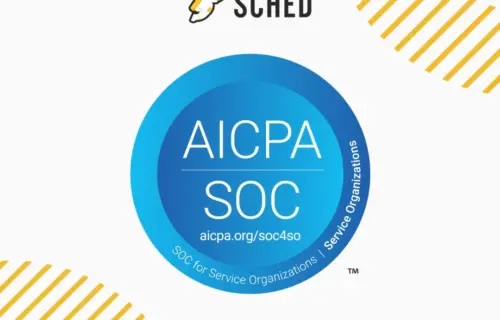Virtual event marketing has become an essential component of contemporary marketing strategies, connecting businesses with audiences in dynamic and innovative ways.
With increasing advancements in technology, virtual events now include a range of formats from webinars to large-scale conferences, each offering unique opportunities for engagement and reach.
These events provide the crucial advantage of reaching larger audiences without the geographical and logistical constraints of traditional events.
In this article, the foundational elements of successful virtual event marketing will be explored, offering insights into effective strategies and techniques.
TL;DR
Table of contents
- 1 TL;DR
- 2 What Is Virtual Event Marketing?
- 3 How Is Online Event Marketing Different From In-Person Event Marketing?
- 4 5 Top Benefits Of Virtual Event Marketing
- 5 11 Different Types Of Virtual Events
- 6 12 Virtual Event Marketing Ideas & Strategies To Include In Your Marketing Plan
- 6.1 1. Pre-Event Marketing
- 6.2 2. Utilize Influencers
- 6.3 3. Engage With Interactive Content
- 6.4 4. Leverage Paid Advertising
- 6.5 5. Co-Hosting Opportunities
- 6.6 6. Content Teasers
- 6.7 7. Audience Insights
- 6.8 8. Offer Incentives
- 6.9 9. Post-Event Content
- 6.10 10. Social Proof
- 6.11 11. Email Marketing Campaigns
- 6.12 12. Collaborate With Complementary Businesses
- 7 12 Digital Event Marketing Tips For Successful Virtual Event Promotion
- 7.1 1. Identify Your Target Audience
- 7.2 2. Utilize Social Media Platforms
- 7.3 3. Collaborate with Influencer
- 7.4 4. Opt for Paid Advertising
- 7.5 5. Leverage Email Marketing
- 7.6 6. Create Engaging Content
- 7.7 7. Host Pre-Event Webinars
- 7.8 8. Partner with Relevant Businesses
- 7.9 9. Use Analytics Tools
- 7.10 10. Offer Exclusive Content
- 7.11 11. Engage Through Forums and Communities
- 7.12 12. Optimize SEO for Your Event Page
- 8 Takeaways About Event Marketing Online
- 9 FAQs
- 9.1 What Are Virtual Events?
- 9.2 What Is Live Event Marketing?
- 9.3 How Big Is The Virtual Events Market?
- 9.4 What Are The Best Marketing Channels For Online Event Promotion?
- 9.5 What Are The Most Common Mistakes To Avoid When Promoting Virtual Events?
- 9.6 How Can You Measure The Success Of Your Virtual Event Marketing Efforts?
-
- Virtual events continue to gain traction as a valuable tool for reaching and engaging audiences globally. The flexibility and cost-effectiveness of digital platforms make them an attractive option for event organizers.
-
- Key strategies for successful virtual event marketing include leveraging targeted digital advertising, interactive content, and collaborations with industry influencers to boost visibility and engagement.
-
- Platforms like Sched provide comprehensive features for creating engaging virtual experiences, such as event registration, scheduling, and attendee networking tools.
What Is Virtual Event Marketing?
Virtual event marketing is the practice of promoting events that occur entirely online. These events can range from large conferences to smaller internal meetings.
The flexibility of virtual events allows for a diverse range of formats and scales.
Virtual event marketing involves using various strategies such as social media campaigns and email marketing.
Social media platforms play an essential role in creating buzz and anticipation for these events.
Event planners and marketers must adapt to changing conditions and preferences of their target audience.
With technology offering new possibilities, virtual event marketing has become an integral part of event promotion strategies.
How Is Online Event Marketing Different From In-Person Event Marketing?
Online event marketing introduces unique dynamics compared to in-person events. The absence of a physical venue allows wide reach but requires creative strategies to capture the audience’s attention.
Audience Engagement
Virtual events offer interactive features like live polls, chats, and Q&A sessions. These tools keep attendees engaged but need thoughtful planning. In contrast, in-person events rely on physical interactions and experiences.
Cost Factors
Virtual events often reduce costs related to venue hire, travel, and catering. These savings can be redirected into digital marketing strategies, optimizing reach. In-person events typically have higher logistical expenses.
Data Collection
Digital platforms enable comprehensive data collection, offering insights into attendee behavior through analytics. This information guides future marketing efforts. In-person events capture data but often require manual processes.
Reach and Accessibility
Online events break geographical barriers, allowing global participation. This often results in higher registration numbers, though maintaining attendance can be challenging. In-person events have location constraints, impacting reach.
Marketing Channels
Virtual events make extensive use of email and social media. Platforms such as Facebook Live or Instagram Stories play a crucial role. In-person events leverage traditional advertising along with digital channels, balancing both to drive attendance.
Event Experience
The experience varies significantly. Virtual attendees rely on digital content delivery, while in-person events focus on physical immersion. Effective online event marketing adjusts content for screens, ensuring it is engaging and accessible.
5 Top Benefits Of Virtual Event Marketing
1. Wide Reach
Virtual event marketing allows organizers to reach audiences globally. Unlike physical events, there are no geographical barriers. This ensures that attendees from various locations can participate easily, broadening the scope and increasing potential engagement.
2. Cost-Effectiveness
Virtual events generally incur fewer costs compared to traditional events. Venue rentals, travel, and accommodation expenses are eliminated. Moreover, marketing digitally can be more budget-friendly, offering cost-efficient advertising options.
3. Accessibility
With the use of digital tools, virtual events enhance accessibility. People with mobility issues can participate without the challenges of physical attendance. In addition, the use of recordings ensures that information is available on-demand.
4. Better Data and Analytics
Virtual events provide rich data analytics. Organizers can easily track attendee behavior, engagement levels, and feedback. This data is crucial for refining marketing strategies and improving future events.
5. Flexibility and Customization
Virtual platforms offer flexibility in event design. Marketers can tailor the content and layout according to audience preferences. The ability to adjust elements in real-time ensures that the event remains engaging and interactive.
11 Different Types Of Virtual Events
1. Webinars
Used widely across industries, webinars provide a platform for knowledge sharing and training. They offer interactive opportunities through Q&A sessions and polls.
2. Virtual Conferences
These include multiple sessions, keynotes, and panel discussions, aiming to replicate the experience of in-person conferences.
3. Virtual Trade Shows
Exhibitors can showcase products in virtual booths, allowing for real-time interactions with attendees.
4. Virtual Networking Events
Designed to foster connections among participants, these events often use breakout rooms or chat features.
5. Virtual Product Launches
Offer a dynamic way to introduce new products to a wide audience without geographical constraints.
6. Virtual Workshops
Focused on hands-on activities, these sessions provide in-depth learning experiences in a virtual setting.
7. Virtual Job Fairs
Employers and job seekers can connect in an online environment, often featuring live chats and resume uploads.
8. Virtual Fundraising Events
Nonprofits can host online auctions or virtual runs to raise funds while engaging donors.
9. Virtual Team Building
These events are designed to improve team dynamics and morale through games or collaborative activities.
10. Virtual Concerts/Performances
Artists perform for viewers online, offering accessibility to fans worldwide.
11. Hybrid Events
Combine in-person elements with virtual components, catering to both local and remote audiences.
Each type of virtual event offers unique formats to achieve specific goals while increasing accessibility and reducing logistical challenges.
12 Virtual Event Marketing Ideas & Strategies To Include In Your Marketing Plan
1. Pre-Event Marketing
Promote your virtual event across social media and email channels well in advance. Building anticipation early helps in increasing registrations.
2. Utilize Influencers
Partner with influencers relevant to your industry to reach a broader audience. They can create buzz and drive traffic to your event page.
3. Engage With Interactive Content
Incorporate polls, Q&A sessions, and live chats during the event to boost attendee engagement.
4. Leverage Paid Advertising
Invest in targeted digital ads to enhance your event’s visibility and attract more participants.
5. Co-Hosting Opportunities
Look for opportunities to co-host events with other brands or industry leaders. This provides access to a larger audience pool.
Share short snippets or teasers of what attendees can expect. Highlight key speakers, special segments, and exclusive content.
7. Audience Insights
Tailor marketing strategies using audience insights. Understanding demographics and preferences leads to more personalized outreach.
8. Offer Incentives
Provide early-bird discounts, access to exclusive content, or giveaways to encourage registrations.
9. Post-Event Content
Distribute recorded sessions, blog posts, and highlights to keep the conversation going and engage those who missed the event.
10. Social Proof
Use testimonials and case studies from past events to build credibility and trust among potential attendees.
11. Email Marketing Campaigns
Plan a sequence of emails leading up to, during, and after the event to keep attendees informed and engaged.
12. Collaborate With Complementary Businesses
Team up with businesses that complement your services to broaden your reach and co-market the event.
12 Digital Event Marketing Tips For Successful Virtual Event Promotion
1. Identify Your Target Audience
Understanding who will attend is crucial. Craft messages that resonate with specific demographics.
2. Utilize Social Media Platforms
Leverage platforms like LinkedIn, Instagram, and Facebook. Each offers unique strengths to boost visibility.
3. Collaborate with Influencer
Partners can amplify reach. Engaging respected figures draws attention.
4. Opt for Paid Advertising
Digital ads expand reach significantly. Budgeting for them can enhance registration numbers.
5. Leverage Email Marketing
Keep your audience informed. Regular updates maintain engagement.
6. Create Engaging Content
Use videos, images, and interactive elements. These capture interest effectively.
7. Host Pre-Event Webinars
Generate excitement with a sneak peek. This helps in nurturing potential attendees.
8. Partner with Relevant Businesses
Collaboration broadens exposure. Choose partners aligned with your event goals.
9. Use Analytics Tools
Track performance through analytics. Adjust strategies based on data insights.
10. Offer Exclusive Content
Audience attention can be drawn with content not available elsewhere. Incentivize participation.
11. Engage Through Forums and Communities
Widely announce your event in relevant spaces. Connect with attendees before the event.
12. Optimize SEO for Your Event Page
Improve discoverability through search engines. Tailor keywords to attract your target audience.
Takeaways About Event Marketing Online
Virtual event marketing has become an essential tool for reaching broader audiences and engaging participants effectively.
By using a combination of social media channels, email campaigns, and paid advertising, marketers can enhance visibility and drive successful online events.
Tracking attendee engagement, conversion rates, and feedback offers insights into what works and what needs refinement, aiding in the development of future strategies.
FAQs
What Are Virtual Events?
Virtual events are gatherings that take place online rather than in person. They include webinars, virtual conferences, and online workshops, providing opportunities for interaction through digital platforms.
These events allow attendees from different geographical locations to participate, eliminating travel constraints.
Benefits include cost-effectiveness, broader reach, and enhanced flexibility.
Organizers often use tools like live streaming, chat functions, and virtual breakout rooms to engage participants, creating a dynamic and interactive environment that mirrors physical events.
What Is Live Event Marketing?
Live event marketing involves promoting and executing events in real-time, engaging audiences through dynamic presentations and interactions. It capitalizes on the ephemeral nature of live experiences to capture attention and encourage participation.
Key elements include creating intrigue beforehand, encouraging live participation, and providing engaging content during the event.
Maintaining a strong social media presence is essential to maximizing live engagement and fostering a sense of community among participants.
Successful live event marketing combines thoughtful planning with responsive execution.
How Big Is The Virtual Events Market?
The virtual events market has grown significantly, driven by technological advancements and increased demand for remote engagement. Market estimates suggest it will continue to expand, showcasing a diverse range of platforms and solutions tailored to varying event types.
Factors driving growth include increased internet accessibility, enhanced digital tools, and shifting attitudes towards remote participation.
The market encompasses everything from small-scale webinars to large international conferences, reflecting its versatility and growing importance in the events industry.
What Are The Best Marketing Channels For Online Event Promotion?
Marketing virtual events effectively requires identifying and utilizing the right channels.
Social media platforms are powerful tools for interaction and promotion, supported by email campaigns for targeted communication.
Search engine marketing and influencer partnerships can expand reach to broader audiences.
Event organizers often leverage these channels to create pre-event buzz and maintain momentum throughout the event.
Each channel offers unique features that, when used effectively, maximize audience engagement and participation.
What Are The Most Common Mistakes To Avoid When Promoting Virtual Events?
Avoiding common pitfalls is crucial for successful virtual event promotion.
Neglecting audience engagement and failing to specify target demographics can undermine efforts.
Poorly coordinated marketing campaigns and over-reliance on a single channel are additional errors to avoid.
It’s essential to develop a cohesive strategy that incorporates diverse tactics and regularly evaluate its effectiveness.
Ensuring that all elements—from content to timing—are aligned and compelling will help attract and retain participants.
How Can You Measure The Success Of Your Virtual Event Marketing Efforts?
Measuring success involves assessing both quantitative and qualitative metrics to understand and improve event outcomes.
Key performance indicators (KPIs) such as registration numbers, attendance rates, and audience engagement provide valuable insights.
Feedback surveys, post-event analysis, and social media metrics contribute to a comprehensive evaluation.
These metrics help identify areas for enhancement, enabling organizers to refine strategies for future events.
They ensure that objectives are met and stakeholders are satisfied with the results.









